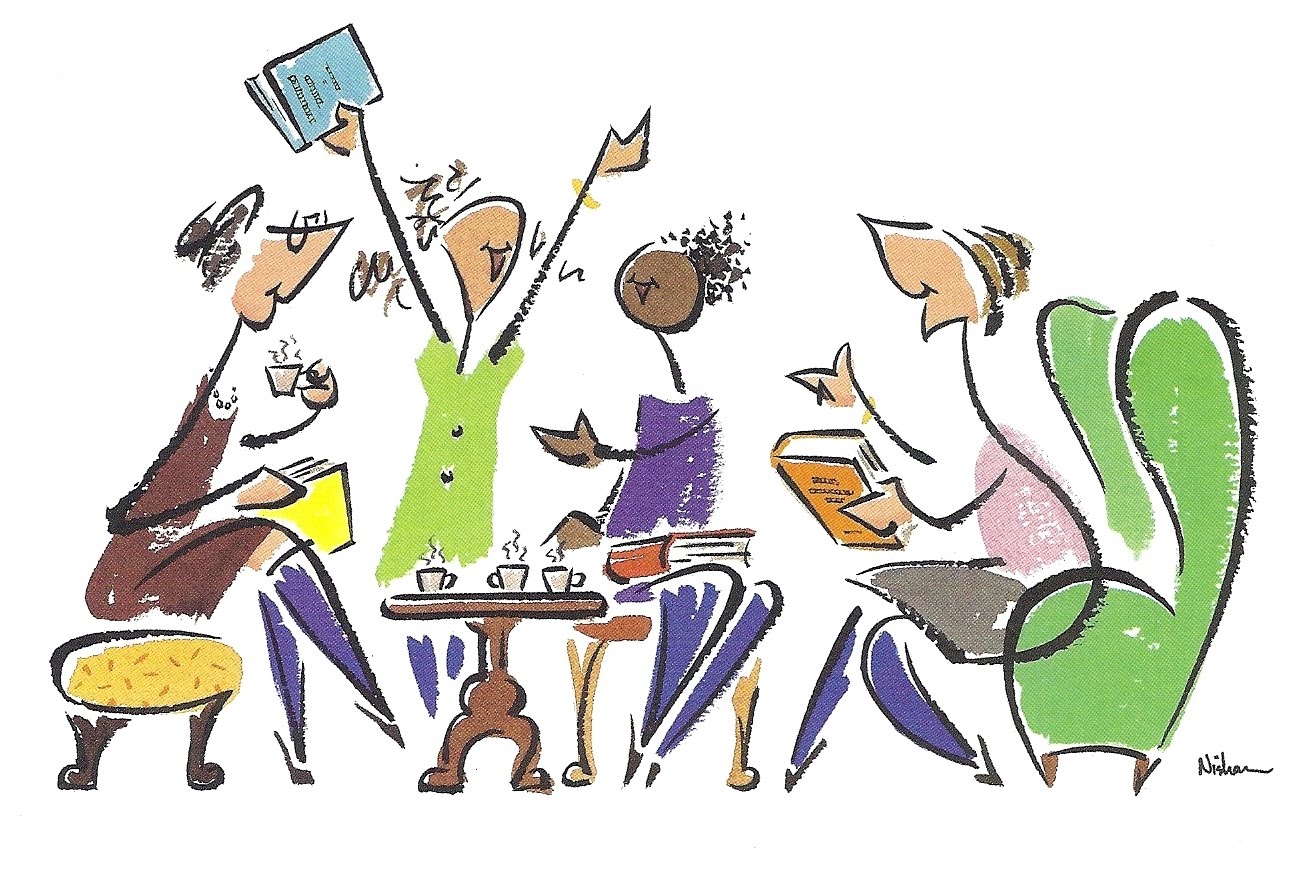
by bsquared5@aol.com | Aug 30, 2016 | Thoughts
A staggering statistic has been battered about lately. Something like 28% of American adults did not read a single book last year. Not in print, not on Kindle, not even plugged into an audio book on a long commute.
Who are these people? I do not know them. Books accompany me at all times, just in case I have extra minutes in the pick up line at school, in a doctor’s office, or at a kid’s sports practice. Whispered confession: occasionally, if it’s a real page turner, even at long red lights. They tuck me in at night and share my breakfast when I wake up. Going a whole year without turning a page would be like giving up chocolate: no bueno.
My bookshelf houses mostly fiction. Turns out, that’s mostly what women read, while most men who read (a much rarer species) head for the non-fiction. Supposedly this is because fiction has characters, and women specialize in empathy, making it easier for us to get caught up in the story. Also, we are (again a generalization) a more patient gender, and from an earlier age have learned to sit still to actually make it to the end of a novel.
Women congregate. We huddle up. We have play dates, lunch dates, ladies’ night out, and entire girls’ weekends. Women who read, it stands to reason, gather over books. Book clubs are a lot like friendships. Some weather all phases of life and meet steady as clockwork for decades. Some wax and wane with the members’ seasons of life, knitting new ties and loosening old ones.
I’ve been in several book clubs since my 20’s, each with its own flavor. With book clubs, as in life, diversity of membership is best for interesting discussion. Over the years, members have included different nationalities, races, ages, religions, and marital status. Best book we discussed: Gone to Soldiers by Marge Piercy.
Book clubs are dynamic entities that require care and feeding to survive. While book clubs are as varied as the books they celebrate, some basic principles apply to each.
First, (duh) book clubs work best if the members read the book. If you hate it, choke it down so at least you can say why you hated it. If you read it weeks ago and can’t remember any of it, jot down some notes or highlight your copy so you can point out thought-provoking or well-written passages. Reading books does take time and some self-discipline. Knowing I have to share some halfway intelligent opinions by a certain date spurs me to turn off the TV and quit scrolling through Twitter so I can finish and contribute.
Whether you rotate who chooses the book or your group is led by a scepter-wielding dictator, people’s preferences differ so don’t shoot the messenger. The person who picked the book probably didn’t write it, so if it was the worst drivel you’ve ever slogged through, blame the author, not the chooser. Intimidation and insults don’t stimulate meaningful conversation, generally. If this happens a lot for you, maybe you’re in the wrong group.
Also, kind of the whole reason book clubs exist is so you can branch out, grow, learn from others’ experiences and perspectives, yadda yadda yadda. So probably you shouldn’t dig in your heels and refuse to be flexible. Unless it’s one of the group’s stated tenants that it “doesn’t read horror,” for example, it’s kind of like eating at someone else’s house. You don’t make faces, declare it “Yucky!” and refuse to try a bite. Surely something in the book will interest you. Come on, just try it! You can read your personal preference outside the group.
Some book groups are highly disciplined, following the reader’s guides in the back of the book and staying on task. Some have good intentions but manage to keep falling down tangential rabbit holes. If your goal is actually to discuss the book and not just to finish the bottle of wine, it helps for the person who chose the book to have some questions to rein in the gossip and chatter. Depending on the personalities in the group, this can be a herculean task and frustrating for those who came for a book club. This is when Dory’s voice plays in my head: “Just keep swimming, just keep swimming, that’s what we do, we swim….”
Mix it up. Many popular titles are released as movies or TV series. (Think Outlander or Girl on a Train.) Double dip and have a girls’ night out field trip to compare the book with the movie. (Spoiler alert: the book is always better.)
Thanks for reading! To return to the FICTION WRITERS BLOG HOP on Julie Valerie’s website, click here: http://www.julievalerie.com/fiction-writers-blog-hop-aug-2016

by bsquared5@aol.com | Aug 29, 2016 | Thoughts
My oldest went sky diving a few weeks ago. She took off with a group of friends and jumped out of a perfectly good plane while, 2 hours away, her dad and I checked our phones nervously for news of a safe landing.
This is par for the parenting game. About three seconds after I became a parent, every cell in my being zeroed in on the safety of that little bundle. And about three seconds after that, my kids seemed to delight in finding new ways to hurt themselves.
I did all the right stuff–electrical outlet covers, car seats, a lock on the chemicals under the sink, talks about strangers, the internet, drugs and alcohol, driving skills, and safe sex. Still, they found ways to get broken arms, ding the car, and make asinine choices. From their first steps (right into the edge of the coffee table) to the scraped elbows from the epic wreck on the bicycle, 90% of parenting felt like I was chasing them around with bubble wrap, which they’d fling off and set fire to.
I put my 3-month-old down for a nap once, grabbed the baby monitor and went to our unfinished upstairs to paint some window frames. My husband came home for lunch that day, poked his head up to say hello, then left a short time later. When I heard the baby stirring on the monitor, I headed down to get her and discovered he’d locked the door, which was always our habit. I was trapped, the baby out of reach with no one around, no phone.
Panic! I calculated how many bones would break if I jumped out the second story window. Tried throwing myself into the door to break it down. (It doesn’t work like it does in the movies.) Everyone else in the cul de sac was at work, except… A solitary teen aged boy was playing basketball several doors down. I screamed at him, hanging out the window and waving my arms like an insane person until he came over, let himself into my house, and freed me from my prison. (Clearly, his parents had not taught him about Stranger Danger.)
This same child locked herself in her room as a toddler, and I sat on the other side of the door, our fingers touching underneath, frantically fumbling with the skeleton key. There is nothing so agonizing to a parent as being helpless to reach a child who needs you.
Ask any parent of a chronically ill child, watching as they’re wheeled to yet another procedure. Or the parents denied access to their adopted child month after month while foreign governments sift through red tape. Divorced parents who share custody with an irresponsible or abusive ex. Parents of deployed soldiers. It’s all part of the package, except, eager to reproduce, none of us ever reads the fine print.
A friend who recently dropped off her kid at college lamented to me that she couldn’t stop worrying about something happening and not being able to get to her daughter. I get it. My own is scheduled to study abroad next semester and I’ll admit to feeling similar twinges, especially after Paris, Brussels, and Nice hit the news cycle. But that’s fear talking. And fear is not the Boss of me. “Love is what we’re born with,” says Marianne Williamson. “Fear is what we learn here.”
Parenting is nothing if not risk. From the time they’re born, we perform a kind of catch and release with our hearts. It’s a tight-wire balancing act: keep them close, send them out; swoop in to rescue, let them learn to fall. The end goal is, after all, to work ourselves out of a job.
https://youtu.be/he3zaola7YE
Full disclosure: I grew up in the 70’s and 80’s when we rode our bikes miles from home (sans helmets) and drank straight from the garden hose The surgeon general was barely even a thing. I’m in favor of running barefoot, grabbing mane on a galloping horse, climbing trees, and “Swing higher, Daddy!”
Yes, there are moments of panic and anguish as a parent, times when you can’t protect your child or prevent every misstep. Did we really believe it would all be giggles and lollipops? We can’t fetishize safety because of a world that feeds off fear like it’s sugar. When did failure became the new F-word? Failure is the only way forward.
The flip-side of risk is where the good stuff hides out. The flip side of risk is connection, creativity, a life with flourish. Sometime, we have to let go of the back of the bike and quit running along behind. I’m too old for that noise, for one thing. And parenting was never supposed to be about my fear–it’s about their launch.

by bsquared5@aol.com | Aug 22, 2016 | Thoughts
It’s the kiss of death: the eye roll accompanied by a muttered “she’s so annoying.” If you’re around teenagers at all, you probably hear it often. Everything, it seems, is annoying. Their hair, teachers, friends, homework, schedule, chores, siblings. It’s an endless list, and if you happen to parent one of these pleasant creatures, I don’t have to tell you that you often make the list’s Top 10 as well. Your rules, your music, the way you ask questions, whatever you choose to wear out in public.
Maybe it’s most obvious with that age group because they haven’t yet mastered self-restraint. While the millenials (a.k.a. Generation Me) may seem to captain the helm of narcissism and snark, this constant state of annoyance doesn’t rest solely with them. A brief scroll through social media reveals a smorgasbord of political, societal, and personal pet peeves. Everyone is annoyed by something! Which may explain last fall’s hype generated by the possibility of an eye-roll emoji. Because we needed more ways to convey sarcasm and superiority.
This trendy dismissive attitude even shows up in the way people (especially females) speak. One of my favorite examples is this clip from Faith Salie on the vocal fry used by young women. As she points out, each generation will always develop a way of speaking that is unique to them. It’s a way to set themselves apart from the other, presumably more annoying, generations. This current trend of vocal fry communicates a kind of apathy or cynicism that is apparently a means to appear chic. Ironically, it also sounds totally–well–annoying. Much like the toss-off “What. Everrrrr.”
I’ve been trying to put my finger on what it is about the “that’s so annoying” refrain that bothers me so much. Sure, some things by definition ARE annoying: mosquitoes, pop-up ads, and that 2011 “Friday” song by Rebecca Black. But what is it that makes everything so annoying? At its heart, annoyance is a symptom of preoccupation with self. If it doesn’t suit me, my tastes, my needs, my desires, then it is beneath me and not worthy of my concern. When it comes to a persistent house fly, yes. When applied to another person, no.
Ask any middle schooler. There’s no faster way to be ostracized than for someone to declare you “annoying.” It seems more benign than “fat,” “ugly,” or “stupid,” but the label, usually delivered with a hair toss and eye roll, sets you in the category of the unseen, not even worth my notice. As a tween girl, it doesn’t get much worse than that.
Annoying is selfish. Rooted in pride, it conveys superiority, and unchecked, it slides easily into contempt. Contempt is a nasty beast. In a court of law it can land you a hefty fine or jail time because judges, at least, recognize it for what it is: disrespect. Contempt is the last stop on the train to dehumanizing someone and making it okay to wound them.
Pride and contempt, says CS Lewis, have been “the chief cause of misery in every nation and every family since the world began.” Recent research has found that the eye roll may be the number one predictor of divorce. Not that shocking given all it conveys to the person you’ve vowed to honor and cherish.
Annoying is a cowardly habit. It requires less of us. Annoying requires less compassion, less bravery, less personal change. It’s much easier to be dismissively cynical than to engage another person, to know them and give them grace. It requires nothing of me to dismiss with irritation any given political candidate and all his/her fans. It’s nothing to me to drive by the homeless guy and grouse about his laziness.
How many consistently annoyed people do you know who are happy? Are they fun to be around? Do you enjoy their complaining? The vicious cycle of everything and everyone being annoying is that eventually your annoyance becomes the very thing you despise–it makes you tiresome. And then it’s just like your Mama used to warn you: you keep making that face and it’ll freeze that way.

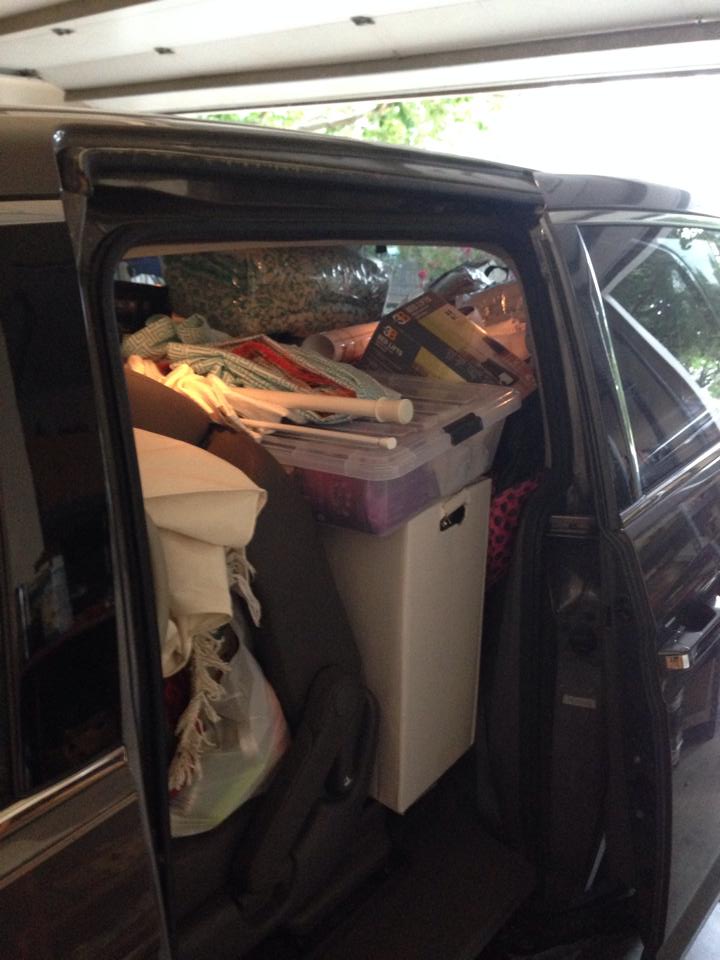
by bsquared5@aol.com | Aug 17, 2016 | Thoughts
We are two years in to having a kid at college. This weekend marks our 4th move into or out of a dorm. Sometimes we get lucky and have an elevator. Occasionally we’ve had to lug carpet, mini fridge, and endless bags of clothes up and down stairs. In August. In the sweltering humidity of the south.
I’ve watched the social media postings of friends over the past week as many of them experienced this transition for the first time. It’s emotional. It’s a big step for you, for them. It changes things for the siblings left behind, even if they score the vacated bedroom.
If you’re one of these first-time parents of a college kid, you’ve probably simultaneously relished the last weeks of summer with your darling at home still under your roof and occasionally gritted your teeth and checked the calendar as if to hurry along the exodus. A pre-adult stretching his or her wings and chaffing at the bit to be free can be both wondrous and maddening.
When you moved in, you met the roommate and other parents. You negotiated room arrangements and shifted furniture this way, that way until it was livable. Then, you realized you had to lift everything AGAIN to put the carpet down. Advil was your drug of choice at this point. If you were really industrious, maybe you assembled a shelf unit or helped hang curtains, stocked the mini fridge with healthy snacks, delaying the inevitable goodbyes and hurried advice to “make good choices!”
Fast forward 9 months to the end of freshman year. It’s hard to fathom now, here in the heat of August, but it will come sooner than you think. Weren’t we just moving him in here? The sheets, no longer fresh and creased, might never have been washed at all. They, along with the comforter, pillows, and other bedding, will be stuffed unceremoniously into a garbage bag along with a sock or two that you’ll discover jammed between the bed and wall. Don’t even open the mini fridge. You don’t want to know.
The things that were so carefully packed in Rubbermaid containers back in August will be wadded up and crammed so the drawers hardly close. And the carpet? God help you if the dorm housed girls. I don’t remember this being a shag carpet. It’s not. That’s the new three-inch layer of hair coating each fiber. Try not to touch it as you roll it up and slide it into the elevator. All of this is coming back home with you for the summer to be stored somehow in their room (over their sibling’s dead body!) or garage, or if you’re lucky enough to be out of state, maybe in a rented storage unit where you don’t have to see it.
Now, two years in, the towels and sheets have been replaced. Sheets don’t stand up well to a bed that’s used as a place to sleep, study, hang-out, eat, and cry over finals. We will not speak of the original first-year carpet. The one we’ll be moving in this weekend is a hand-me-down.
As a pseudo-veteran of this process, I offer a few suggestions for key items you might put into your student’s boxes–if you can fit anything else into the back of the van.
- Medication. Odds are, with the new environment (which we’ve already established is not always as “sterile” as it could be), the stress (good stress) of being in a new place, and close quarters with lots of other germy people, at some point your student will come down with something. If you are not there with chicken soup, it’s helpful to have a small pharmacy of cold medicine, etc. to choose from. Give them their own insurance card in case they need to visit the campus clinic or other doctor.
- Chlorox wipes. (see #1)
- Quarters, for laundry, not drinking games. In theory, this prevents them schlepping it all home en mass, where 47 loads must be done in the space of one weekend. In theory. They still will schlep.
- Pizza cutter. Plus a few other basic kitchen tools like a couple of bowls and silverware for quick cereal before that first class when there’s no time for the cafeteria.
- Tool kit. A small starter tool kit with some extras inside like Command hooks, various tape, glue, tape measure, small hammer and screwdrivers. They’ll be the most popular kid on the hall.
- Essential replacements. Light bulbs, batteries. Extra printer ink and paper. These are lifesavers during late-night studying or paper writing when they’re up against a deadline.
- Starbucks card. (see #6) Just because you’re nice, and you will miss them, a little.
- Electric blanket. My father gave my daughter a spare one of these and she has said repeatedly it’s her favorite item she took to college. Dorm room temperatures aren’t always controllable, and it’s nice for a cozy afternoon nap.
- Useful decor. If you have a daughter, consider assembling a place to hang/keep jewelry where it won’t get tangled. We made one (see pic below) out of an old frame and painted pegboard with bookshelf rests. Super cute!
- Car Stuff. If they have a car, make sure they have all the insurance and registration info, and consider signing up for AAA. Peace of mind for minor breakdowns or if they get locked out.
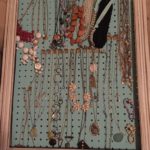
About a third of the stuff they can’t live without the first time they move in will trickle its way back home over the next three or four or seven moves back and forth. My cousin’s parents actually moved her thirteen times. Thirteen. Just let that sink in.
Take heart, rookies: they do come back. They won’t be the same shiny new freshman you packed off that first semester. They will meet people and have experiences you will know nothing about. They will grow into themselves and become even more interesting, funny, and big-hearted than you can imagine. I know this to be true, and we’re only halfway through.
I found a chrysalis in the backyard this summer and watched it carefully for signs of the butterfly emerging. Of course I got busy with life and the  next time I checked, it was empty, its inhabitant finding its wings just fine without me. I’m not gonna lie: I was a little disappointed that I didn’t get to witness it all first-hand. But I’m guessing maybe it needed that independent struggle to emerge the way it was meant to, in a flutter of brilliant color, winging skyward.
next time I checked, it was empty, its inhabitant finding its wings just fine without me. I’m not gonna lie: I was a little disappointed that I didn’t get to witness it all first-hand. But I’m guessing maybe it needed that independent struggle to emerge the way it was meant to, in a flutter of brilliant color, winging skyward.
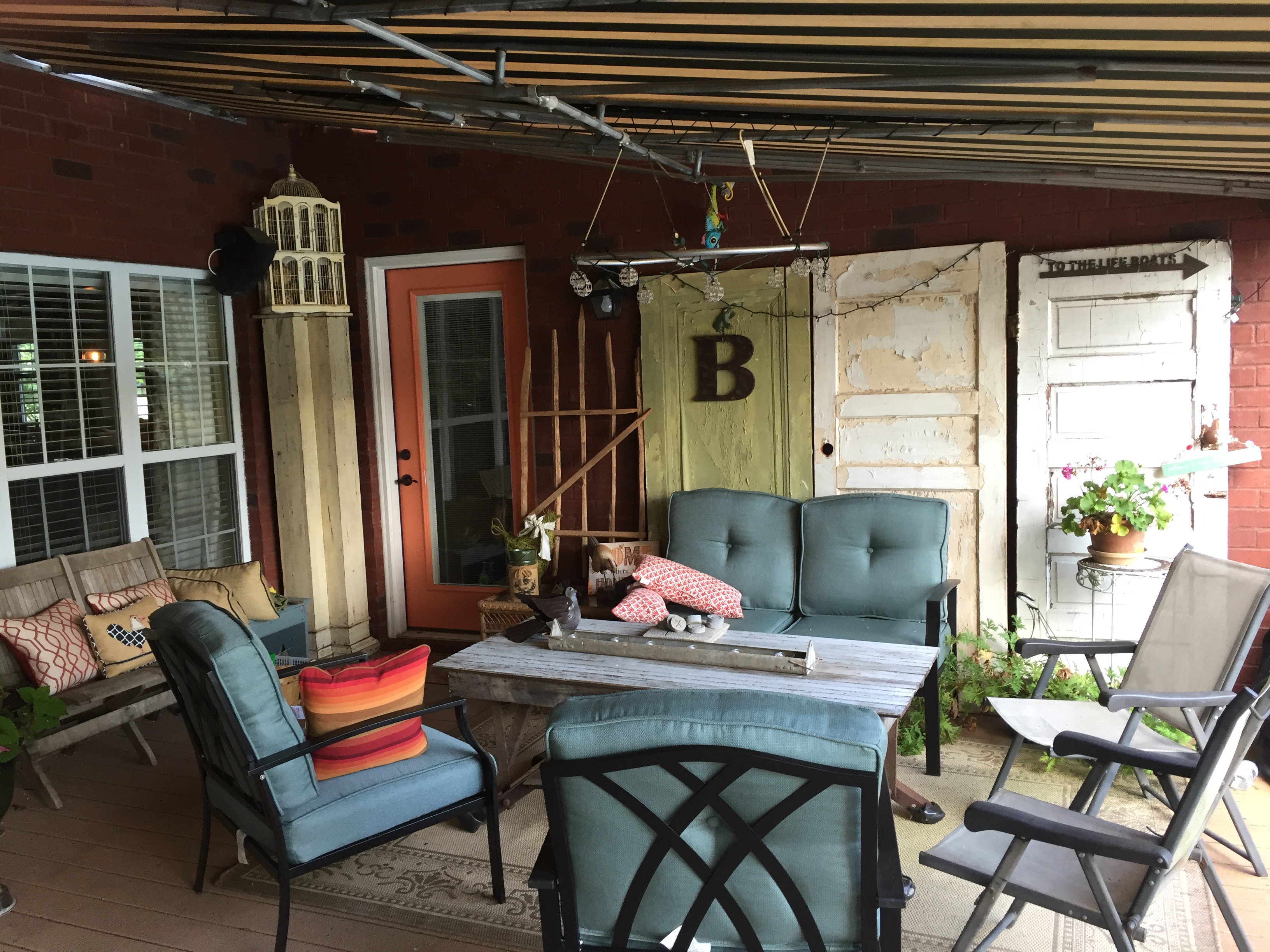
by bsquared5@aol.com | Jul 29, 2016 | Thoughts
Wide was the divide between the northern and southern halves of my family, but one thing the southern side had going for them was porches. In the South, before there was central air and climate control and before 432 channels were on every TV, there were porches. That people actually sat on to “visit.” With other people.
Mamaw’s house actually boasted two porches–one in back where Papaw worked on his electric fishing reels and where the wringer washer sat, and one in front, with actual windows, effectively her indoor greenhouse. This was in northern Florida, but lest they become too soft, my grandparents hardly ever used the window a/c’s. So when the summer air was sticky and close, we’d retreat outdoors to the back porch in search of a breeze.
My sisters and I would fight over the sacks of muscadines and peaches we’d picked up at the Georgia roadside stands on the trip there, and my mother and Mamaw would snap beans, shell peas, or shuck corn, depending on what the garden offered that day. You could tell their moods by their pace–slow and lazy was a good sign; brisk snapping with a quickly filling bucket meant you’d best give over the sack and share the peaches.
My mother and her siblings grew up on those porches. The screen door slammed behind them on their way out of the kitchen. They greeted neighbors there, collected bins of reels that needed fixing, broke up, made up, and snuck back in, tiptoeing up the slanted wooden steps, shoes in hand and giggling too loud. My siblings and I played cards out there, read books, and petted the raggedy cats that came to slink around our legs and meow for scraps of fish.
At the other end of the house, the front porch off the living room was filled with pots of philodendron vines and spider plants. In the tropical heat, they grew to infinity, creeping out of their containers, their vines roping outward until they had to be tacked to the walls and ceilings to keep the chaos at bay. Every surface was leafy, and if you were lucky, you got to sleep out there on the daybeds beneath that tangled jungle. I used to drift off to sleep, slightly worried that in the dark of night, with only the buzzing cicadas bearing witness, I’d be incorporated, somehow, into the curtains of green, never to be seen again.
In the South, porches are where you cut your teeth on lolly-gagging. You may or may not have a swing, screens, or the kind of upright rockers that come from Cracker Barrel, but that’s not the point. There’s an unspoken art to it, an easy cadence. Porch is more of a verb than a noun. It means soaking in a long summer evening, the kids sticky from popsicles, bug spray, and sunscreen. It means swatting a few mosquitoes and drinking sweet tea. It is the South. There is no un-sweet tea. We are not philistines.
Porching is greeting your neighbors barefoot, garden tomatoes in hand, and asking about mom’n’em. It’s digging splinters out of a kid’s foot with the nearest pocket knife and jawing about the finer points of local politics over the low grind of the ice cream maker and the steady thump of the dog’s tail against the floor. Because we are commoners, it’s a far cry from the grand veranda and stately columns where Scarlett O’Hara held court for all her beaus. But porching isn’t meant to be fancy.
There’s this place not far from us, up on top of Monteagle, Tennessee, called the Monteagle Sunday School Assembly. An unassuming little slice of community, it sits quietly on top of the mountain, a collection of charming cottages with the best porches around. The MSSA has been operating there over 100 years, conducting spiritual and educational activities during sessions each the year. It’s a little like TV’s Mayberry. Those who come to stay walk the trails and regularly stop by each other’s porches for conversation and company. I drove around there once, met a few folks, and marveled at the trillium and wildflowers in bloom. Lovely.
We work so hard trying to find things to salve our hurts, reading all the books, playing all the roles. You can’t find a much better de-tox than morning coffee with the hummingbirds or talking it out with a friend til the moon rises and the moths beat against the porch lights. We need less scrolling-a-screen time and more unwinding screened-in time. What if the healing things, the holy things we need for sustenance and buoyancy, are the same as the ordinary things right in front of us? Shucking corn while rain drips from the eaves. Laughter with a sister or two. Peaches, popsicles, and porches.
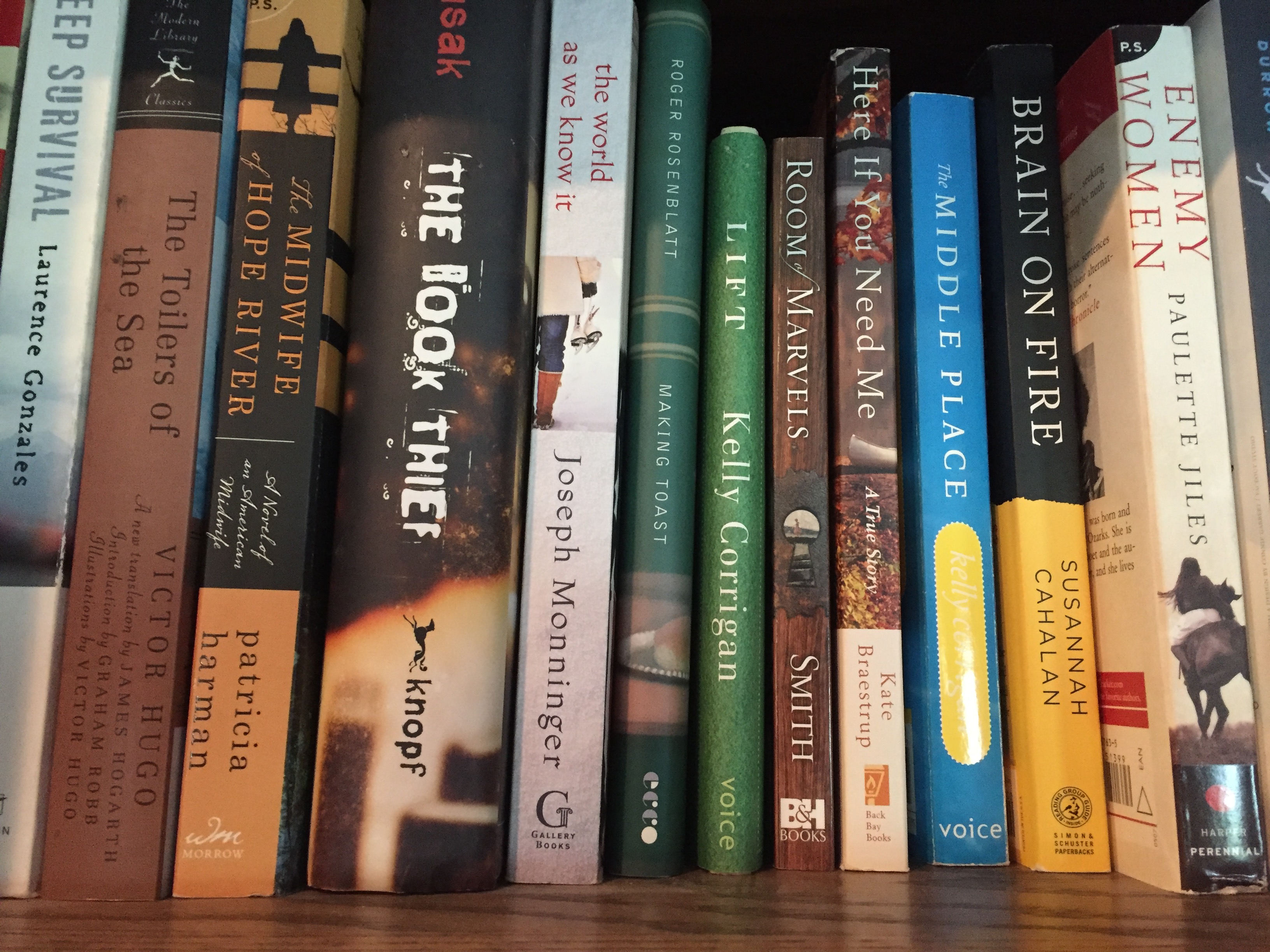
by bsquared5@aol.com | Jul 26, 2016 | Thoughts
As the fourth of five siblings, most of my childhood books had already been well-loved by the time they came to me. Covers, if they remained at all, were worn and tattered, often with some words rubbed off altogether. My parents’ shelves were lined with classics, all with identical green and gold covers, designed to look swell on display.
In middle school, we were instructed to cover our textbooks with folded paper bags from the grocery store, which provided blank canvases for doodling in class. Later, we learned to camouflage Flowers in the Attic or Wifey so we could read such contraband without parental interference. My formative reading experience was with books from the local library, their jackets wrapped in annoying crinkly cellophane secured to the book with yellowing tape.
Book jackets were either absent or needed to be engineered or endured. I learned not to pay attention to them. Cover art only spoiled the images of characters or places my imagination would create, and reading the pert summaries might reveal too much of the plot.
Titles held the allure for me. They were the beckoning finger, the enticing come hither. Once the title had my attention, if I could make it through the first paragraph with my interest piqued, then I’d give it a go. Happy, sad, horror, mystery, romance–it didn’t much matter so long as the story had a decent pace and the plot wasn’t too predictable. A book’s jacket, if it had one, was useful as an impromptu page marker at best.
Turns out, I may be an anomaly. Apparently, second only to favorite author, jacket copy is the next most important factor in the average person’s book purchase. Plus, most people don’t want to work that hard to figure out what a book is about. Who has time to read an opening paragraph or even a whole chapter to sample an author’s voice and style when you can make a quick judgment based on crafted adjectives and celebrity reviews?
Of course there’s a wealth of talent and creativity in those who design cover art and word jacket summaries! Clever design and painstaking art are beautiful in their own right. Many covers can stand alone as frame-able. Distilling a novel to its essence in just a few enticing sentences can be insanely difficult. And woe to you if you mislead the reader, billing a plot as horror when it’s more suspense or thriller. Forgiveness comes slowly. Despite an entire industry devoted to them, jackets are advertising: show and spin, designed to turn heads. The meat lies within.
We are a fickle species, our attention diverted by sparkle, shine, the new, and the next. Witness the trend of movie tie-in covers, which may generate additional buzz, but for purists who know the movie is rarely (never?) as good as the book, are insulting. Plus, I don’t need Daniel Radcliffe’s face staring at me from my nightstand, thank you. That’s what Google’s for.
An accidental experiment: While writing this post, the book I’m currently reading (The Secret Chord by Geraldine Brooks) sat on the counter, sans jacket, just a plain dark brown cover. My teenage son, who despite my best efforts would rather eat an entire can of beets than read (et tu, Brute?), repeatedly picked it up and thumbed through it, almost without realizing it. When I asked why he kept being drawn to my book, he said it was because it had no cover and he wanted to see what it was about!
It was a mystery, an invitation to explore, which is what books are all about in the first place. When it’s all done for you, laid out in bold type on the cover, maybe it steals some of the discovery. When we were young, my mother would occasionally bring home a case of discount canned goods with no labels. Sometimes you’d get pickled asparagus, but sometimes you’d get your favorite. I guarantee it made dinner that week an adventure!
Am I a book jacket curmudgeon, shaking my cane at the bright and shiny displays lining the entryways of bookstores? Perhaps. But maybe jackets shouldn’t be abandoned totally. Juniper Books, based in Boulder, manufactures custom jackets on a large-format printer to create unique and artistic book displays. What if bookstores displayed Jack London’s works like this, using murals based on some of the themes in his novels.

source: http://www.wired.com/2012/06/book-design/
Maybe it wouldn’t be 100% practical, but wouldn’t it be interesting to look for books on politics in a section shelved like this?

source: http://www.wired.com/2012/06/book-design/
There’s no denying the whimsy and visual effect!
Maybe book jackets are essentially costumes. We have been conditioned to pay no attention to the guy with the crooked necktie and thick-rimmed glasses. He may be Mr. Right, strong, faithful and affectionate, but he looks like everyone else. When he steps into that phone booth and dons a pair of tights and a bodysuit emblazoned with a giant “S,” we sit up and take notice. Same guy–he was there all along–but it took some primary colors and bold type to show us Superman was in our midst. From now on, they’re not book jackets. I’m calling them Book Capes.
Thanks for reading! To return to the FICTION WRITERS BLOG HOP on Julie Valerie’s website, click here: http://www.julievalerie.com/fiction-writers-blog-hop-july-2016











